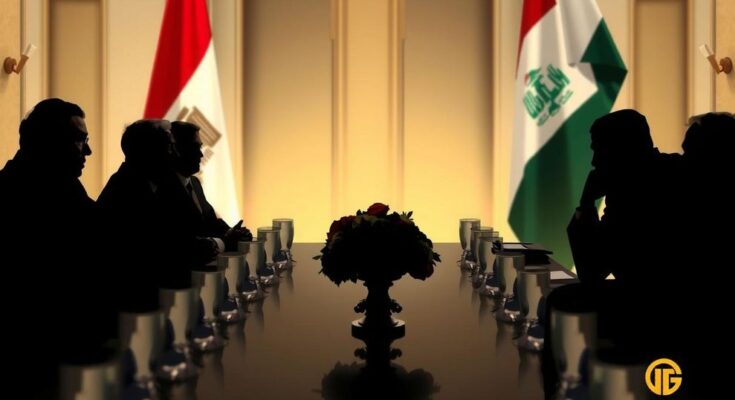Foreign ministers from Egypt, Jordan, and Iraq condemned Israeli actions in Gaza and Lebanon during the UN General Assembly, calling for international intervention to cease escalating violence. The situation in Lebanon is dire, with severe civilian casualties reported, while tensions remain high with Hezbollah’s retaliatory actions. Global leaders stress the need for a diplomatic resolution and caution against further escalation.
The foreign ministers of Egypt, Jordan, and Iraq convened on the sidelines of the 79th session of the United Nations General Assembly in New York to express their joint condemnation of Israeli actions in Gaza and Lebanon. They urged for international intervention to halt the increasing violence in these regions. The foreign ministers articulated that the escalation in the region necessitates immediate actions, emphasizing that the cessation of Israeli aggression in Gaza should be the priority. They condemned the ongoing Israeli strikes in Lebanon, cautioning that such actions could propel the entire region towards a full-scale war. A joint statement issued by the ministers underscored, “The escalating violence must stop, starting with halting Israeli aggression on Gaza.” They further warned of the severe repercussions of Israel’s actions, asserting that Israel holds responsibility for the deteriorating situation with potential consequences extending throughout the region. In Lebanon, the toll of the conflict has heightened, with the nation’s health minister describing the current circumstances as “carnage.” Hospitals are under immense pressure, overwhelmed by casualties from two days of Israeli air strikes directed at Hezbollah forces. Firass Abiad observed to BBC reporters that many of the 550 fatalities recorded were civilians, including women and children. In retaliation to Hezbollah’s actions, particularly the launching of rockets into Israeli territory, Israel has continued its military operations. Israeli forces killed key figures in Hezbollah’s military hierarchy and carried out extensive bombings, leading to significant civilian casualties. Reports indicated that an Israeli air strike on a Lebanese village resulted in the deaths of six family members of a deceased Hezbollah fighter, including two young children. Despite the escalated violence, U.S. President Joe Biden addressed the U.N. General Assembly, advocating for diplomacy and stating that wider conflict is “not in anyone’s interest.” UN Secretary-General António Guterres echoed these sentiments, warning against the potential for Lebanon to devolve into conditions akin to those in Gaza. Human Rights Watch has also highlighted the dire situation, stating that the ongoing bombardments pose a grave risk to civilians in Lebanon and has called for a comprehensive investigation into Israel’s strikes and Hezbollah’s retaliatory actions. The current state of affairs in the region continues to be precarious, with both a humanitarian crisis and the threat of further escalation looming.
The ongoing conflict in Lebanon and Gaza has drawn significant international concern. The actions of Israel in these regions, particularly in relation to Hezbollah, are critical in understanding the geopolitical dynamics at play. The meeting of the foreign ministers from Egypt, Jordan, and Iraq reflects a collective Arab stance against perceived Israeli aggressions and the urgent need for international intervention to restore peace. The historical context of Israeli-Lebanese relations and the longstanding conflict involving Islamist groups like Hezbollah adds complexity to this situation. It is crucial to consider the humanitarian implications of military actions, particularly the impact on civilian populations, as reported by various rights organizations and health officials in affected areas. The calls for United Nations involvement and global attention signify the increasing alarm over potential regional destabilization, which could have far-reaching effects beyond the immediate conflict.
In conclusion, the joint condemnation by the foreign ministers of Egypt, Jordan, and Iraq highlights the urgent need for international intervention to address the escalating violence in Gaza and Lebanon. The statements made emphasize Israel’s responsibility for the worsening situation, with the humanitarian crisis in Lebanon illustrating the severe consequences of continued military actions. A diplomatic solution remains essential as global leaders call for stability in a region perpetually affected by conflict.
Original Source: www.dailynewsegypt.com




